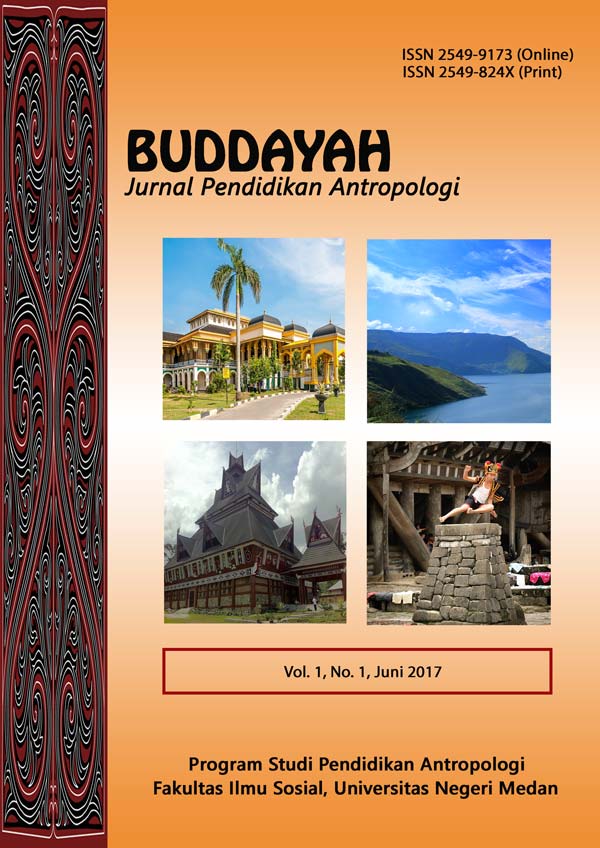Suku Sakai Merebut Ruang Kebijakan Afirmatif
DOI:
https://doi.org/10.24114/bdh.v3i2.29023Abstract
This study discussed the strategy of the Sakai Tribe in Pematang Pudu Duri Raiu Village in Duri to implementative of the affirmative space for the government and companies. The Sakai Tribe community in Pematang Pudu received an affirmative policy to grant for studies, integrated agriculture programs and local business development programs. Since the LBD (Local Business Development) program was run, local entrepreneurs grew from zero to 21 entrepreneurs, while all students and students received scholarships from companies and the Bengkalis district government. The novelty of this research was very strong because there has been no similar research and no research on indigenous peoples has shown success like this. The study used an ethnographic design, where the researcher stayed for 2 months in the field conducting involved observations and in-depth interviews. The data was validated by several informants, then analyzed qualitatively and written descriptively. The study found that the affirmative space process obtained by the Sakai Tribe in Pematang Pudu Village was a long effort and involved a wider network. The most concrete steps taken by the Sakai Tribe are the formation of the middle class through education, strengthening the Sakai identity, building several Sakai institutions and social movements such as demonstrations and lobbying efforts. This article contributes to political anthropology, especially in terms of efforts to affirmative policy. This article can be a best practice to be applied for indigenous peoples in Indonesia.Keywords: Affirmative Policy, Sakai Tribe, political anthropology.References
Amady. M Rawa El, 2014, Negara Orde Baru Industrialisasi dan Masyarakat Lokal (Riau), Yogyakarta, AG Litera
Ansor. Muhammad, 2007, Kelas Menengah Sakai Dan Gerakan Civil Society Seri Kertas Kerja JSPDL No. 4 April 2007. Hal 1-33
Ansor . Muhammad, 2007, Kelas Menengah Sakai dan Gerakan Civil Society, kertas Kerna No 4. Jaringan Studi Pemberdayaan Demokrasi Lokal, h 1-34
Dhiaulhaq. Ahmad, 2021, Peran Lembaga Internasional Dalam Penyelesaian Konflik SDA, dalam buku œPraktek Penyelesaian Konflik di Luar Pengadilan Editor M. Rawa EL Amady, Lakeisa, Klaten.
Puri. Widhiana Hestining, 2013 Kontekstualitas Affirmative Action Dalam Kebijakan Pertanahan Di Yogyakarta, Jurnal Bhumi No. 37 Tahun 12, April 2013, Hal 171-180
Purba. Bantu. 2011, Dan Perlindungan Hak-Hak Konstitusional Masyarakat Hukum Adat Suku Sakai, (Studi tentang Peraturan Hukum dan Implementasinya terhadap Kebijakan Penierintah yang Menimbulkan Konflik Masyarakat Suku Sakai di Kabupaten Siak dan Kabupaten Bengkalis Provinsi Riau), Desertasi. Program Doktor (S-3) Ilmu Hukum Program Pascasarjana Fakultas Hukum Universitas Islam Indonesia, Yogyakarta
Sukirno, 2015, Kebijak Afirmatif Pengakuan dan Perlindungan Masyarkat Adat, Jurnal Masalah Masalah Hukum jilid 44 no3 Juli 2015 (26 DES 2016), page 326-335.
Sayuti. Hendri , 2013, Hakikat Affirmative Action dalam Hukum Indonesia (Ikhtiar Pemberdayaan Yang Terpinggirkan) Jurnal Menara, Vol. 12 No. 1 Januari “ Juni 2013, Hal 41-47
Tumbe. Zidane (2020) Perlindungan Hukum Terhadap Hak-Hak Budaya Masyarakat Adat Dalam Perspektif Hukum Hak Asasi Manusia, Lex Et Societatis Vol. VIII/No. 1/Jan-Mar/2020, hal 5 -14.

